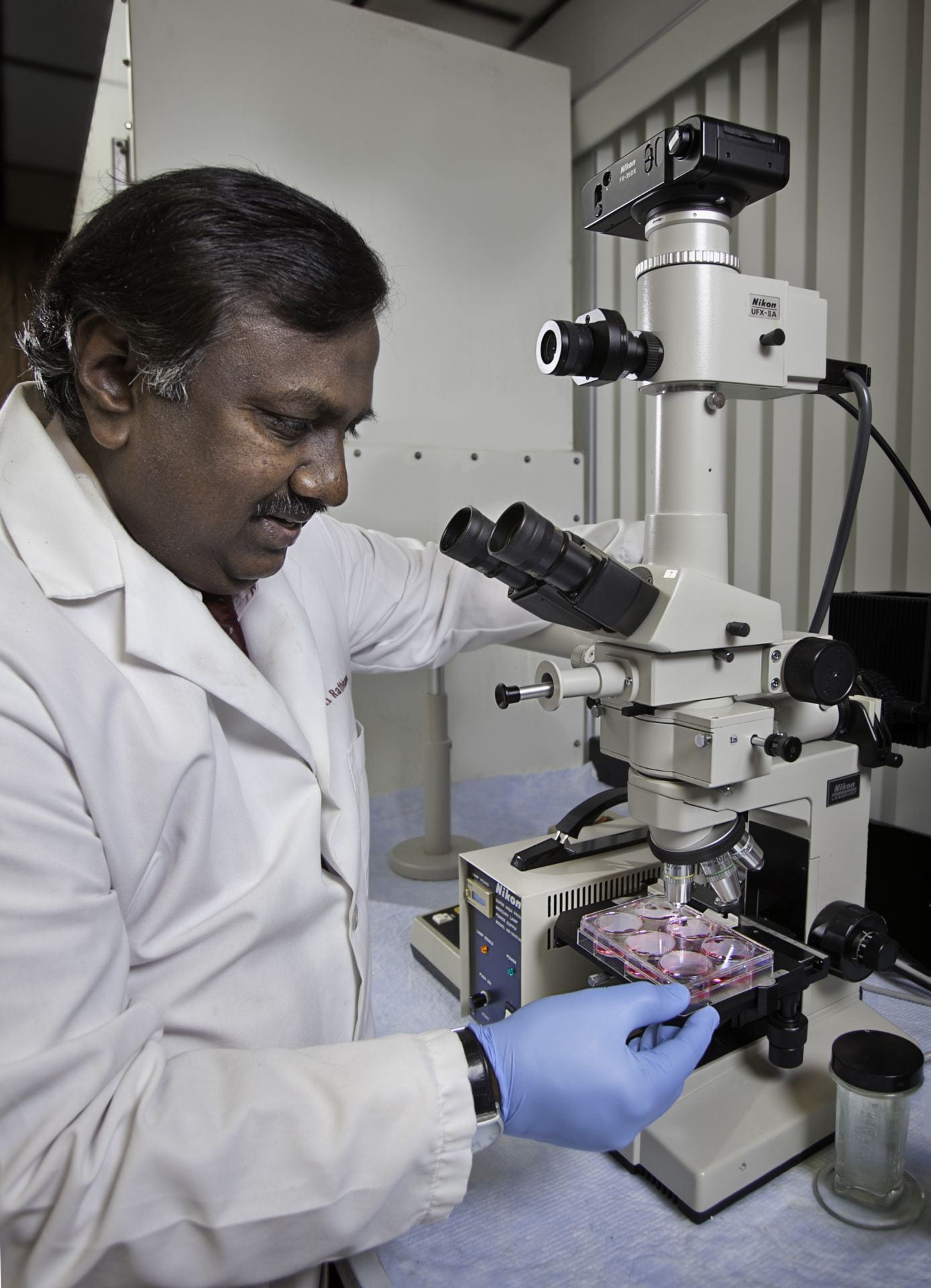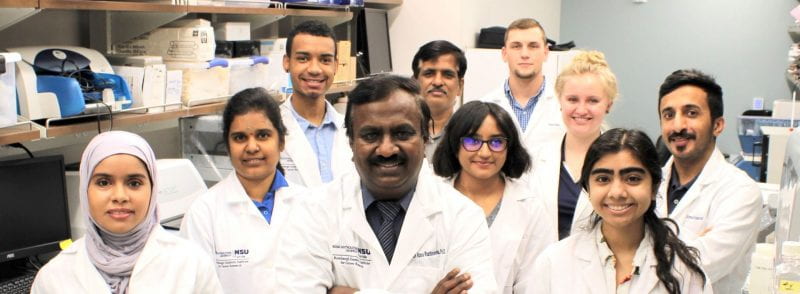Spotlight on a Researcher – Dr. Appu Rathinavelu


Prevalence of cancer among Americans has increased from 11.7 million in 2005 to 18.2 million in 2020, and solid tumors constitute a significant proportion of these numbers. Solid tumors such as retinoblastoma, sarcoma, endocrine tumors, and other types also make up 30% of all pediatric cancer cases. Although there are therapeutics targeting solid tumors, there is an urgent need to develop new treatments that will be more cost-effective, less toxic to healthy cells, and have better anticancer properties.
Appu Rathinavelu, Ph.D., Executive Director, Rumbaugh-Goodwin Institute for Cancer Research (RGI) at Nova Southeastern University (NSU) has dedicated his research to the pursuit of developing a better understanding of solid tumors, identifying novel therapeutic targets, and finding effective cures. Dr. Rathinavelu joined NSU in 1992 and in addition to leading RGI, he also holds the position of Associate Dean for Institutional Planning and Faculty Development in the NSU College of Pharmacy. He has published over one hundred research articles, co-authored a textbook, presented his research at multiple national and international scientific conferences, and has been awarded multiple patents for his scientific discoveries in the field of anticancer drugs.
One of the key therapeutic pathways for cancer that Dr. Rathinavelu’s research focuses on is inhibiting or eliminating solid tumors by cutting off the blood supply needed for the tumors’ survival. To achieve this, for over a decade, scientists at RGI have been involved in research targeting a protein called Vascular Endothelial Growth Factor (VEGF) and testing different possible chemical compounds that could inhibit its function. The VEGF protein and its receptor (VEGFR) are ideal targets for this method as their functioning is essential for forming new blood vessels, a process known as angiogenesis. This inhibition of new blood vessel development, known as anti-angiogenesis, is what Dr. Rathinavelu’s lab is using to eliminate solid tumors.
A team of researchers under Dr. Rathinavelu’s guidance at NSU’s RGI has applied computational pharmacology to screen and identify novel molecules for their ability to bind to VEGFR and inhibit angiogenesis, the findings of which were published in 2005. Testing of these compounds on both cell culture assays (in vitro) as well as in animal models (in vivo) of different solid tumors has yielded promising results. These novel therapeutic compounds have shown efficacy against solid tumor both when used alone and in combination with anticancer drugs such as paclitaxel.
One type of solid tumor against which existing anticancer drugs have had very limited success is a brain cancer called Glioblastoma Multiforme (GBM). The five-year survival rate of patients with GBM is only 5% and the median survival post diagnosis is only one year. Considering the dependence of GBM on angiogenesis, researchers in Dr. Rathinavelu’s lab applied the therapeutic strategy of inhibition of VEGFR to prevent angiogenesis in the GBM tumor. In preliminary in vitro and in vivo experiments, one of the molecules demonstrated both anti-angiogenic and pro-apoptotic (induces cell death) properties, making it an ideal candidate for treating GBM. This is due to GBM’s survival and growth being largely reliant upon increased vasculature development. When this drug candidate’s efficacy in treating brain cancer and secondary toxic effects were tested and compared with currently used chemotherapy drugs (temozolomide and paclitaxel), it demonstrated better or equivalent efficacy and less secondary toxicity compared with both chemotherapy drugs. These findings by Dr. Rathinavelu’s research team can lead to a new treatment modality for GBM and possibly other hard-to-treat brain cancers.
Dr. Rathinavelu’s research on the use of anti-angiogenic molecules as possible cancer therapeutics has resulted in three issued patents and many scientific publications in peer-reviewed journals (https://www.researchgate.net/profile/Appu-Rathinavelu). The next step in the development of these novel therapies is to initiate human clinical trials so that their efficacy in treating patients suffering from solid tumors can be clinically established. NSU is now looking to form collaborations with pharmaceutical companies who can facilitate clinical trials and commercial development of these therapeutic molecules for the benefit of cancer patients.
Over the years, the cancer research initiatives of Dr. Rathinavelu at NSU have received generous support from the Royal Dames of Cancer Research, as well as from Community Foundation of Broward and the State of Florida Board of Education – Center for Biomedical and Marine Biotechnology. These partnerships with funding agencies, industry players, and other academic organizations enable RGI to continue conducting ground-breaking basic and translational cancer research, which will lead to development of new cancer therapeutics with the hopes of drastically improving the prognosis for the most difficult to treat cancers.
